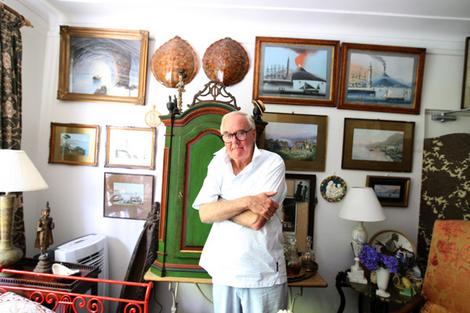
Edward Young … "What I wanted was to take on the little man, Howard, and fight."
Photo: Peter Rae
Every so often, Edward Young sits on the couch in his apartment and closes his eyes. "And then I just pretend I'm not here any more," he says.
It has been 10 years since his partner, Larry Cains, died. They met in London in 1960 - he, a model, was introduced to Mr Cains, a photographer who had served with the Australian Army in Borneo during World War II.
"He was desperately handsome," Mr Young said. "We spent two weeks together and I told him I wanted to spend my life with him."
Now, after a decade of fighting to have the law recognise his and Mr Cains's love as equal, the Sydneysider will soon become the country's first recognised gay war widower.
Laws passed in November mean that partners in gay relationships with serving and retired soldiers will, for the first time, be allowed to claim pensions - opening the door for the so-called "forgotten people" of our military heritage and allowing for more people to make claims that must be paid out.
The decision will end a long-winded battle for Mr Young that began in a small inner-city law office, when he applied for a pension only to find the Veterans' Entitlements Act limited the definition of "couple". Under the old law, his 38 years with Mr Cains were invalid because he could not prove he was "living with a member of the opposite sex".
Having lived through a time when discrimination against gay men was rife, Mr Young said the wording still jolted him. "I didn't really need the pension," he said. "I didn't even really want it. What I wanted was to take on the little man, [the former prime minister John] Howard, and fight."
Mr Young took his claim to the Office of the United Nations High Commissioner for Human Rights. The case dragged on for years.
"I wanted a decision that wouldn't just apply to my own circumstances," he said. "What I wanted was something that would apply right across the board. I wanted something that would say that, yes, there was discrimination and it didn't just apply to me. It applied to all facets of our law."
In September 2003 the UN concluded Australia had breached the International Covenant on Civil and Political Rights and Mr Young was "entitled to an effective remedy, including the reconsideration of his pension application without discrimination based on his sex or sexual orientation".
But the victory was short-lived. Although the decision was used as a reference point in other countries to implement anti-discrimination laws, the Howard government held out on reviewing Mr Young's case. As late as November 2007, the UN high commissioner asked the government to clarify whether it would review its laws. A spokeswoman for the Veterans' Affairs Minister, Alan Griffin, said yesterday the new laws would apply to Mr Young and take effect in July.
"People such as Mr Young will not be denied a war widow or widower's pension on the basis of a same-sex relationship," she said. "We would encourage anyone who was (or is) in a same-sex relationship who wishes to make a claim to the department to do so after that date."
The last jolt in his struggle came this week when Mr Young applied for his war pension one last time before the legislation changes.
He received the familiar pro forma rejection letter from the Department of Veterans Affairs informing him he did not qualify for the pension: "But I don't mind waiting another six months," he said. "The laws have been changed; we've won now. I've been waiting 10 years."